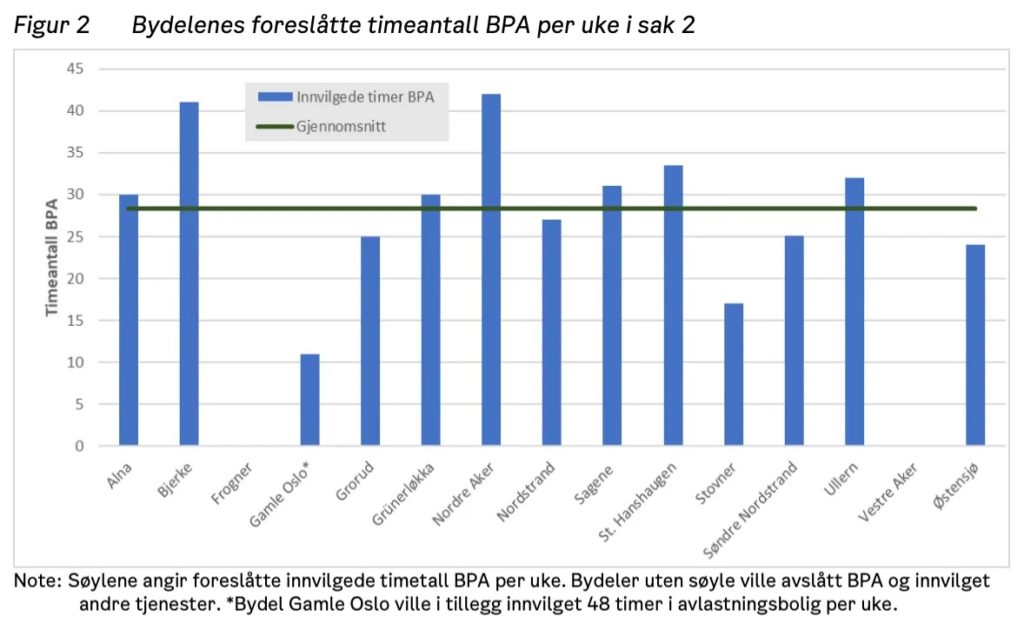DEFECTIVE PRACTICES IN THE ALLOCATION AND FOLLOW-UP OF DECISIONS ON BPA

The municipal audit in Oslo presents in its management report several shortcomings and weaknesses in the allocation and follow-up of BPA. The report shows, among other things, shortcomings in the mapping and assessment of users' assistance needs, insufficient participation, lack of equal treatment in the assessment and allocation of BPA and insufficient documentation, decision-making and follow-up of decisions.
The municipal audit in Oslo presented its report on 18.10.21 "Allocation and follow-up of user-directed personal assistance". The report is the result of an administrative audit that has been carried out in the Nordstrand District and the Old Oslo District, but also contains a broad survey of all districts in Oslo municipality.
What is an administrative audit?
Administrative audit is a statutory task that all municipalities have, and is defined through Section 23-3 of the Local Government Act as follows:
"Administrative audit involves carrying out systematic assessments of finances, productivity, regulatory compliance, target achievement and effects based on the municipal council's or county council's decision"
In practice, it is the case that the control committee in the municipalities draws up a plan in which areas an administrative audit is to be carried out, based on a risk and materiality assessment. That is, where the need is greatest. Such a plan must then be adopted by the municipal council or the county council.
Broad survey
The findings of the survey show that the number of users who receive BPA in Oslo municipality, divided by district, is very varied. The same applies to the processing time and processing time for complaints. According to the audit, the findings from the survey also highlight possible differences in the districts' assessment practices. Including both the number of hours and whether BPA would be an appropriate organization of the service offer.
Among other things, the Control Committee sent out three fictitious applications for assessment in the various districts. Case 2 concerns parents with three children who seek relief for their multi-disabled child organized as BPA. The boy is at a relief home two weekends a month. The parents feel that this has worked badly, and the boy does not want to be there. The boy also has a support contact three hours a week. The parents want more hours of support contact and that this is included in the BPA scheme. The boy is 12 years old, dependent on routines and needs assistance with most tasks during the day. Below you can see the districts' assessments:

Figure 2 shows that 13 districts would have granted BPA to the family to varying extents. Two districts would grant other services. In addition to BPA, one district would grant 48 hours of residential relief per week. The district pointed out, among other things, that the boy would need assistance throughout his life and would probably have to live in a staffed home. According to the district, it might be wise to get the boy used to relief at home now. Two districts would refuse BPA and grant other services.
The management report's findings
The municipal audit has further assessed whether Bodel Nordstrand and Bodel Gamle Oslo have satisfactory practices related to the allocation and follow-up of user-directed personal assistance (BPA). The findings in the report itself conclude that Bydel Gamle Oslo not has satisfactory practices related to the allocation and follow-up of BPA. Furthermore, the findings show that Bydel Nordstrand facilitated satisfactory practice in many areas, but they also have some shortcomings and weaknesses in practice.
Large variations in case management practice have been uncovered, and the City of Old Oslo assessed in several cases that BPA was not appropriate, even if the applicant meets the conditions. The audit concludes here that the district's assessments are not in line with the Patient and User Rights Act. In the same district, the audit also notes that the findings in the report indicate that the district does not always comply with the State Administrator's instructions, beyond the case in question. In Bodel Gamle Oslo, several supervisors in the individual BPA scheme also report that dialogue with the borough is difficult, and the audit questions whether the borough sufficiently ensures equal treatment when mapping and service offers, based on findings during the audit. This is consistent with Løvemammaene's experiences with the Old City of Oslo, based on the countless cases in which we have assisted our members here.
The audit's recommendations
Based on the findings that have been made, the audit has the following recommendations to Oslo District, Nordstrand District and the city council for health, elderly and citizen services:
"The municipal audit recommends that both districts consider measures to
- Strengthen the involvement of users and next of kin when applicable, including the involvement of children
- Ensure that the proceedings are in writing
- Ensure that decisions are drawn up with sufficient reasons
Furthermore, the Municipal Audit Office recommends that Bodel Gamle Oslo implements measures to ensure
- Sufficient mapping and assessment of the user's assistance needs
- Systematisation of the work to follow up the State Administrator's decisions
- Follow-up of private service providers"
This is nothing new
The lion mothers believe that the findings in the management report are not surprising. The report substantiates what we already know, and we refer here in particular to the variations in the service offer for families. Once again, we get confirmation that the offer children and families receive depends to a large extent on the individual user's resources, knowledge and willingness to complain. Shortcomings in the design of decisions and a lack of user participation contribute to the fact that the service offer is not individually adapted, is not in accordance with the user's needs and is not changed in line with the user's needs.
The Løvemammaene also know that neither Bodel Gamle Oslo nor Bodel Nordstrand is in any way unique in its practice. The finds that have been uncovered are representative of large parts of the country. This is also documented by findings in The National Audit Office's report.
This means that the other districts in Oslo and the country's municipalities in general do not need to wait for the next administrative audit, as we already know that current practice has serious deviations and differential treatment. Now is the time to show action!
The mother lions' request to the control committee
The control committee in Oslo will review the report during its meeting on 28 October 2021. The secretariat suggests that the city council take the report for information. This despite the fact that it appears in the case papers that Gamle Bydel Oslo has not notified concrete measures for two of the recommendations.
Løvemammaene believes that the Municipal Audit's report reveals important areas for improvement, but is of little value if the control committee does not ask the city council to adopt concrete measures for follow-up. The city council points out that the city council and the districts have notified specific measures, but Gamle Bydel Oslo has not.
In order to ensure a change in practice, the Lion Mothers believe that the units must ensure that:
- The user's/next of kin's point of view is expressed through written documentation and decisions, and the case manager emphasizes in writing the user's/next of kin's point of view, against the decisions that are made.
- The case manager always meets the child and user in the mapping phase, regardless of whether the child/user is competent to consent.
- All meetings, contact and evaluations are recorded.
- Decisions that are made contain goal setting, description of measures, justification and evaluation.
- The districts must together have clear overall guidelines, routines and inter-control that ensure equal practice in the allocation and follow-up of services.
As regards Gamle Bydel Oslo, the Løvemammaene expects the Control Committee to take particular responsibility for ensuring that they too refer to concrete measures and follow up on the recommendations.
The lion mothers ask that the Control Committee and the city council not only take the case into account, but also follow up on the report and ensure that the necessary measures to change practice have been implemented.
This request has been sent in letter form to the Control Committee in Oslo on 26 October 2021.
- SUBJECTS: Current affairs, BPA, CRPD, Input, Interest political work, Opinions, Our work
- Published:
- The lion mothers
- SUBJECTS: Current affairs, BPA, CRPD, Input, Interest political work, Opinions, Our work
- Published:
- The lion mothers